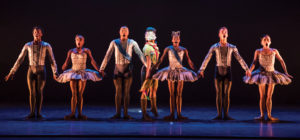London: Summer 2018
- Home
- City Reports 2015 - 2019
- London: Summer 2018

By Sanjoy Roy
In the wake of Valentine’s Day, it was not romance but its aftermath that took centre stage in the London dance scene. Not the rosy coupledom that romantics dream of, but marriages of dysfunction, madness, deception, crossed purposes and dissolution — all of them, as it happened, licensed by Shakespeare.
Opening on Valentine’s Day itself at the alternative Battersea Arts Centre was Ben Duke’s new Juliet and Romeo for his company Lost Dog. Duke established a name for himself with Paradise Lost (2015), a dance-theatre monologue that brought together the big theme of God’s Creation with the obdurate banalities of everyday life. In Juliet and Romeo, he mines this vein further, imagining what would have happened if Romeo and Juliet had escaped their Shakespearean death and instead got married and lived — well, not so happily ever after, actually — in a small apartment, bringing up baby. Duke’s tragedy is less grand than Shakespeare’s, but way more relatable.
Indeed, the performance — very talky, with added dance scenes — began with relationship counselling. Juliet and Romeo first recounted and then acted out the scenes that had brought their marriage to this juncture.
It’s a marvellously clever conceit, allowing the couple (Solène Weinachter and Duke) to traverse seamlessly between past, present and their different understandings of both, interspersed with confessions to the audience as if to their therapist. What we saw was a couple in which each party plays a role in the other’s drama — but not one that they choose, understand or even know. The performance kept returning to one ambivalent and utterly foundational moment: Juliet waking from the dead just in time to stop Romeo killing himself from grief, unaware that Romeo had at that very instant reasoned that life was worth living after all, and he might find fulfilment elsewhere.
The performers were a terrifically good mismatch, Duke’s flop-haired English diffidence constantly snagging against Weinachter’s more direct expressions of force and feeling. Their duets — both verbal and physical — were combinations of misalignments and mistimings, witless entrances and wilful exits. They were funny and sad, but what made this work hit home was not a canny recognition of their relationship, but rather the realization that their lasting romance was predicated upon their death, and in living they become inescapably both less and more than romance — a literary genre, after all — could ever be.
Over in the Jack the Ripper quarter of east London, Wilton’s Music Hall and choreographer Mark Bruce have become longstanding partners, Bruce’s darkly gothic sensibilities well matched with the shadowy atmosphere of London’s oldest music hall. His Macbeth is more a moody imagining than a rereading of Shakespeare — indeed, it is in many ways a series of animated images rather than a narrative. And what images, as lurid and stylish as a Roger Corman film. The three witches stripped off bird-like headdresses to reveal grotesque gorgon faces, and pulled blank-faced baby dolls from handbags. Soldiers opened a ceremonial box to reveal a severed human head. Daggers and swords were everywhere; there’s a forest of spears, and a court scene that had the guests doing a Scottish sword dance, as if there were blades beneath their feet.
Bruce’s Macbeth is a truly ensemble production. The music alternates between funereal dirges and high-pitched horror. Guy Hoare’s lighting (and shading) glows and fades strategically, making the small stage feel unbounded and adrift. Phil Eddolls’ fantastically adaptable designs turned castles into caverns and thrones into deathbeds. The seven-strong troupe of dancers managed to portray an entire cast of characters, but it was ultimately Jonathan Goddard and Eleanor Duval as the Macbeths who carried the show. Manipulative, deceitful and damned sexy, their marriage is an alliance of powers and it is, of course, both destructive and doomed.
For their now regular season at the upscale Barbican Arts Centre, Ballet Black revived Arthur Pita’s 2014 Dream Within A Midsummer Night’s Dream. It opened with familiar balletic partnering: a trio of couples in tights and tutus, their gendered division of performative labour (fish dives, supported arabesques and pirouettes) as wedded to the classical style as traditional marriage is to the church. That didn’t last long.
A puckish, gender-fluid boy scout in toggled safari suit, green tinsel beard and smudged eye shadow sprayed them with fairy dust, liberating the partners from their customary roles into a magical realm of improper couplings and unbound erotics. Helena snorted a line of glitter and got off with Hermia. Oberon fell for the swooningly romantic vision of Lysander trailing diaphanous veils. Pita played his favourite cabaret songs, from Eartha Kitt to Yma Sumac. We were enchanted — and seduced. And when our couples returned to their traditional roles at the end, we knew they had changed. Love had taken them for fools and asses, and it did them a world of good.
DI SUMMER 2018

Photo: Bill Cooper
